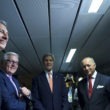Photo Credit: U.S. Army photo by Spc. Tyler Kingsbury/Released
When I went to work for Colin Powell in 1989 he was re-entering his Army career as a newly minted full general. He had just left Ronald Reagan’s White House after two years there, including time as national security advisor. He had plenty of stories and expressions that came from his time with Reagan. Since I was his new speechwriter, I got to share a lot of them. What strikes me most about Senator Marco Rubio, described as an establishment alternative in the circus that is the Republican presidential primary, is his attempt to resurrect the rhetoric of Reagan.
Rubio laid out his foreign policy early, initially in a speech in May, then in an article in Foreign Affairs.
I have detected no allusion to “the shining city on a hill,” but I do detect a politically motivated spiel about the overriding need for American power in the world, as well as words aplenty about our exceptionalism, and the dire and pressing need for, as Rubio describes it, “a dynamic foreign policy that restores strength, promotes prosperity, and steers the world toward freedom.”
There is, too, severe criticism of the Obama administration, as Reagan criticized Carter for his supposedly inept foreign policy.
Like much political talk these days—particularly if it comes from Frank Luntz, Karl Rove, Roger Ailes and their ilk—Rubio’s rhetoric trips off the tongue patriotically while disguising all manner of venality, corruption, nastiness, and even downright evil lurking beneath it.
Missing in Senator Rubio’s Reagan-like rhetoric is the Soviet Bear. But one of the pillars of his foreign policy is a return to the Cold War with Russia. Rubio also wants to open a new front with China.
And he would exacerbate the generation-old conflict with Iran, at a moment when the singular, utterly positive foreign policy achievement of the Obama administration has, for the moment at least, directed that overheated relationship toward promising change through the Joint Comprehensive Plan of Action (JCPOA): the nuclear agreement with Iran.
Rubio’s Russia policy is egregious because Russia’s actions—which Rubio characterizes as unacceptably aggressive—are a direct response to policy mistakes made by Presidents Bill Clinton and George W. Bush and, to a certain extent, continued by President Obama.
Pursuing Georgia and Ukraine as potential members of NATO, placing ballistic missile defenses in former Warsaw Pact countries, and generally acting as if Russia were not only not a great power but virtually non-existent, were massive blunders. It should be recalled that Secretary of State Jim Baker, on behalf of President George H.W. Bush, promised Moscow that if it accepted Germany’s reunification and retention in NATO, NATO would not go “one inch further east.”
These dramatic U.S. policy mistakes provoked Russia’s recent actions; it should be the United States that assumes the principal responsibility of finding ways to repair the relationship. Reagan-like belligerence in the face of such realities is tantamount to strategic stupidity—and is very dangerous.
Moscow and Washington share vital national security interests. Without one another, it is unlikely that these interests will be protected. Common interests include: an end to the terrible civil war in Syria and the defeat of the radical elements there; a successful implementation of the JCPOA with Iran; and further movement on decreasing the numbers of nuclear weapons in the world and thus the potential for nuclear conflict.
Rubio’s policy pronouncements on China are just as bad. In fact, they are so preposterous that, here again, I suspect he is echoing Reagan to pander to right-wing Republican voters, and not proposing serious policy.
Whether Rubio is attributing the creation of millions of U.S. jobs to the Trans-Pacific Partnership to counter China’s economic growth (remember Ross Perot’s warning about the sucking sound of jobs going to Mexico and elsewhere?), or naively insisting on human rights and liberty as a pillar of his China policy, he is disconnected from reality.
Here’s Rubio genuflecting to Reagan: “President Ronald Reagan proved through his diplomacy with the Soviet Union that having a productive relationship with a great power and insisting on that power’s improvement of human rights are not conflicting aims. If the United States can pursue this agenda with China even as it continues its economic engagement, it will demonstrate that America remains committed to the cause of freedom in our time.”
The last time I had a conversation with a high-level Chinese diplomat, one of the things he said to me was, “Don’t talk to me about China’s human rights record; your country tortured people.” Rubio had best revisit his own party’s record in the White House before using human rights as a political placard. Hypocrisy is not a trump card with Beijing.
Putting “human rights and liberty” ahead of economic and security interests has always sounded good but has never been good policy. This is one of the aspects of my political party—yes, I remain a Republican—that frankly sickens me as much as its racism, bigotry, rabid evangelicalism, and general obtuseness
America’s security has rarely if ever been sacrificed to human rights in other nations. Neo-conservative ideologues might advance this argument, but my experience has found that neocons are liars, dissemblers, only selectively committed to the Jeffersonian principle of human rights. And neocons (Reagan and G.W. Bush advisor Elliott Abrams; Dick Cheney protégé and Iraq war proponent Eric Edelman; onetime Reagan-adviser-turned-Iraq-War-cheerleader Robert Kagan) surround Rubio.
Perhaps the most unbelievable policy articulated by Senator Rubio is his plan for dealing with Iran.
First, his criticism of the painstaking negotiations conducted by the United States, Britain, France, Russia, China, and Germany under the Joint Plan of Action:
As president, I would have altered the basic environment of the talks. I would have maneuvered forces in the region to signal readiness; linked the nuclear talks to Iran’s broader conduct, from its human rights abuses to its support for terrorism and its existential threats against Israel; and pressured Tehran on all fronts, from Syria to Yemen.
Had Rubio done what he says he would have done, the multi-national talks would have collapsed immediately. When negotiating, when conducting diplomacy, one must always—as Winston Churchill said again and again—consider the other side.
Rubio goes on to admit that the tactics he prescribed probably would have ended the talks: “It is true that Iran, in response to these displays of strength, may have broken off negotiations or even lashed out in the region. History, however, suggests that even if Iran had created more trouble in the near term, increased pressure would have eventually forced it to back down. That is exactly what happened in 1988, when Iran ended its war with Iraq and its attacks on oil tankers in the Persian Gulf after the Reagan administration sent in the U.S. Navy.”
History suggests no such thing. In fact, it required far more than “increased pressure” to force Iran to “back down.”
I was present during the deliberations over Operation Earnest Will and Operation Praying Mantis, the two Reagan-directed military actions to which Rubio refers. These operations came at the end of one of the most brutal wars the Persian Gulf region had seen in half a millennium, the Iran-Iraq War. There were hundreds of thousands of casualties on both sides in more than eight long years of war. The United States had vacillated, taking first Iraq’s side, then Iran’s, then both simultaneously. When Reagan ordered the reflagging of the Kuwaiti tankers (Earnest Will) and, later, the sinking of Iranian warships and destruction of their command and control apparatus in the Gulf (Praying Mantis), Tehran correctly interpreted those acts as the United States finally taking Iraq’s side exclusively. It was only then that Iran threw in the towel. At that point, Ayatollah Khomeini is reported to have said, “I drank the hemlock.” It was after almost a decade of brutal, bloody war that Iran accepted that it could not fight both Iraq and the United States–and agreed to a U.N.-negotiated end to the conflict.
Senator Rubio needs to study history more closely.
He also needs to understand that a foreign policy built on the rhetoric of Ronald Reagan is not a foreign policy that would make the United States more secure. The majority of the American people should also realize this. If they did, it would be enough to keep Senator Rubio out of the White House.
Lawrence Wilkerson is Distinguished Visiting Professor of Government and Public Policy at the College of William and Mary. He was chief of staff to Secretary of State Colin Powell from 2002–2005. He served 31 years in the U.S. Army.







I joined the Paratroops shortly after Reagan was elected. At that time, after four years of Carter’s weakness, our allies didn’t trust us and there wasn’t a hostile nation that had anything but contempt for the United States, and they acted accordingly. Reagan changed that. The situation is even worse now than it was under Carter. You can say what you like about Carter, but at no time under Carter did any terrorist ever conclude that he could rape his American captive at will after beheading three others because he had nothing to fear from the United States. The author’s thesis amounts to: “They are big and scary and I am afraid of what might happen if we make them angry.” The United States cannot make policy based on Lawrence Wilkerson’s fears.